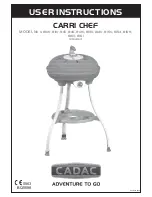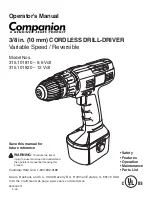
4
Specific Safety Rules
•
Hold tool by insulated gripping surfaces when performing an operation where
the cutting tool may contact hidden wiring or its own cord.
Contact with a "live"
wire will make exposed metal parts of the tool "live" and shock the operator.
•
When working on a ladder or on scaffolding be sure to lay the tool down on its
side when not in use.
Some tools with large battery packs will stand upright but may
be easily knocked over.
•
Use clamps or another practical way to secure and support the work piece to a
stable platform.
Holding the work by hand or against your body leaves it unstable and
may lead to loss of control.
WARNING: Some dust created by power sanding, sawing, grinding, drilling, and
other construction activities contains chemicals known to cause cancer, birth
defects or other reproductive harm. Some examples of these chemicals are:
• lead from lead-based paints,
• crystalline silica from bricks and cement and other masonry products, and
• arsenic and chromium from chemically-treated lumber (CCA).
Your risk from these exposures varies, depending on how often you do this type of work.
To reduce your exposure to these chemicals: work in a well ventilated area, and work
with approved safety equipment, such as those dust masks that are specially designed
to filter out microscopic particles.
•
Avoid prolonged contact with dust from power sanding, sawing, grinding, drilling,
and other construction activities. Wear protective clothing and wash exposed
areas with soap and water.
Allowing dust to get into your mouth, eyes, or lay on the
skin may promote absorption of harmful chemicals.
WARNING: Use of this tool can generate and/or disperse dust, which may cause
serious and permanent respiratory or other injury.
Always use NIOSH/OSHA
approved respiratory protection appropriate for the dust exposure. Direct particles away
from face and body.
SAFETY GUIDELINES - DEFINITIONS
It is important for you to read and understand this manual. The information it contains
relates to protecting YOUR SAFETY and PREVENTING PROBLEMS. The symbols
below are used to help you recognize this information.
DANGER:
Indicates an imminently hazardous situation which, if not avoided, will
result in death or serious injury.
WARNING:
Indicates a potentially hazardous situation which, if not avoided, could
result in death or serious injury.
CAUTION:
Indicates a potentially hazardous situation which, if not avoided, may
result in minor or moderate injury.
CAUTION:
Used without the safety alert symbol indicates potentially hazardous
The label on your tool may include the following symbols. The symbols and their
definitions are as follows:
V ..................volts
A ..................amperes
Hz................hertz
W..................watts
min ..............minutes
................alternating current
............direct current
no ................no load speed
................Class II Construction
................
earthing terminal
..............safety alert symbol
.../min ..........revolutions or reciprocations
per minute
SAVE THESE INSTRUCTIONS
90518364 FS18SW 7/9/07 8:18 AM Page 4





































